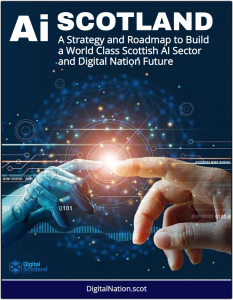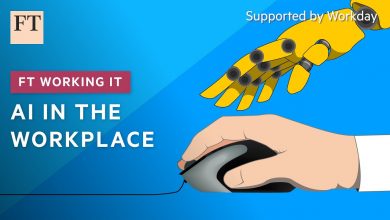Harnessing ‘AI for Social Good’ to End Poverty and Homelessness
By directing artificial intelligence toward “AI for Social Good,” Scotland can transform deep-rooted problems like poverty and homelessness into opportunities for systemic change.
 Scotland faces persistent social challenges that no single policy or charity can fully resolve.
Scotland faces persistent social challenges that no single policy or charity can fully resolve.
Over 680,000 people live in poverty, including one in four children.
Homelessness applications rose 9% last year, with rough sleeping a grim reality in cities and rural towns alike. Yet Scotland has a unique advantage: a world-class tech ecosystem, ethical leadership in AI governance, and a cultural commitment to fairness.
By directing artificial intelligence toward “AI for Social Good,” the nation can transform these deep-rooted problems into opportunities for systemic change.
This is not science fiction—it is a blueprint already taking shape.
Inspiring Scotland: AI for Good in Scotland
Champions here include Inspiring Scotland, where operate their Inspiring Change with AI Fund, a collaborative pilot project designed to investigate how artificial intelligence (AI) can tackle operational challenges in Scotland’s third sector (charities and nonprofits). The primary goals are to boost efficiency, amplify the impact of funded organizations, and promote ethical AI adoption.
On one of our webinar series Kyle Usher of Nesta presented on the topic of ‘Powering Good: Leveraging AI for Social Good’, highlighting the work and investments led by Nesta, who awarded £105,000 of grant funding to seven projects based in Scotland using innovative AI tools to help tackle social challenges.
This report summarizes the work, which included:
- Heriot-Watt University is exploring AI to end gender bias in smart assistants.
- Space Intelligence is using AI to interpret satellite data to map wildlife habitat and help restore, connect and protect Scotland’s natural environment.
- City of Glasgow College is using AI to develop accent recognition and enable adult learners to improve their literacy.
- Housing and care provider Blackwood looks after care users remotely using AI energy monitoring.
- The University of Edinburgh are leveraging AI-enabled smart prosthetics to provide haptic feedback to amputees.
- Red Star AI Ltd use AI to improve the human side of diabetes diagnostics and treatment.
- Using an AI enabled chat-bot, Voxsio help young people talk about and understand their mental health.
Predictive Analytics: Preventing Poverty Before It Takes Hold
Poverty is not random; it follows patterns. Job loss, benefit delays, energy price spikes, and health shocks cascade into debt and despair. AI can map these pathways with precision.
Imagine an early-warning system that integrates data from the Scottish Welfare Fund, NHS records, energy suppliers, and local councils—all with rigorous privacy safeguards under GDPR and the forthcoming Scottish AI Strategy. Machine-learning models could flag households at risk 6–12 months ahead, enabling proactive interventions: automatic top-ups to Universal Credit, priority access to training schemes, or tailored debt advice.
Glasgow City Council is piloting a similar approach with the “Thriving Places” initiative, using anonymised data to target family support. Scaling this nationally could cut child poverty by an estimated 15–20%, according to modelling by the Joseph Rowntree Foundation. The algorithm does not replace human judgment; it amplifies social workers’ capacity, freeing them to build relationships rather than chase crises.
Smart Matching: Ending Homelessness Through Precision Housing
Homelessness is a matching problem: people with complex needs, scattered services, and a finite stock of suitable homes. AI can solve it faster and more fairly than any spreadsheet.
In Finland—Europe’s leader in ending homelessness—AI-driven platforms match individuals to housing within days. Scotland can do the same. A national “Housing First AI Hub” could ingest real-time data on vacant social homes, private rentals, support wraparound services, and individual profiles (veteran status, mental health needs, proximity to family or employment). The system would rank options by long-term stability, not first-come-first-served.
The charity Shelter Scotland has already built predictive tools to identify “hidden homelessness” among sofa-surfers and overcrowded households. Pair this with dynamic allocation algorithms, and wait times could drop from months to weeks. Critically, the AI would be auditable: every decision explainable, every bias actively mitigated through diverse training data and community oversight panels.
Community-Led AI: Power in Local Hands
Top-down tech risks alienation. Scotland’s strength is its community fabric—housing associations, credit unions, and grassroots collectives. AI for Social Good must be co-designed.
Take the Leith Community Crops in Pots project: residents use low-cost sensors and open-source AI to optimise urban food growing. Extend this model to energy poverty. Smart meters, combined with weather forecasts and occupancy patterns, could automate micro-grants for insulation upgrades or heat pumps, prioritising the coldest homes first. The data stays local, controlled by community land trusts, ensuring trust and accountability.
The Scottish AI Alliance’s “Playbook” already promotes ethical, human-centred design. By embedding community voices in algorithm development—via citizens’ juries and participatory budgeting—Scotland can avoid the pitfalls of surveillance capitalism and build tools that *belong* to the people they serve.
The Economic Case: Jobs, Growth, and Moral Leadership
Investing in AI for Social Good is not charity—it is smart economics. Every £1 spent preventing homelessness saves £2.50 in crisis services, according to Crisis UK. Redirecting even a fraction of Scotland’s £100m+ rough sleeping budget into predictive systems would pay for itself within two years.
Moreover, the talent is here. Edinburgh hosts the Bayes Centre and the UK’s largest data-driven innovation hub. Glasgow’s “Smart Things” cluster pioneers IoT for public benefit. By ring-fencing 20% of the Scottish National Investment Bank’s £2bn fund for social-impact AI startups, the government could create thousands of high-skill jobs while exporting ethical AI solutions worldwide.
A Call to Action: From Vision to Reality
The pieces exist: the Scottish AI Strategy, the National Performance Framework’s focus on wellbeing, and a tech sector eager to prove profit and purpose can coexist. What is needed now is political courage and cross-party commitment.
- Launch a Scottish AI for Social Good Challenge Fund—£50m over five years, open to consortia of councils, charities, and universities.
- Establish an independent AI Ethics Board with lived-experience representatives to audit every public-sector algorithm.
- Legislate a “right to explanation” for any AI-driven welfare or housing decision.
Scotland once led the world in enlightenment thinking. Today, it can lead in enlightened technology. By harnessing AI not to replace human compassion but to scale it, the nation can write a new chapter: one where no child grows up cold, no veteran sleeps on the street, and opportunity is coded into the fabric of society.
The future is not written in silicon alone—it is written in the choices we make today. Let Scotland choose wisely, bravely, and together.



